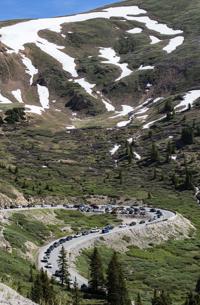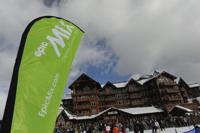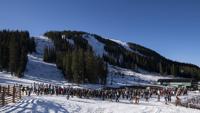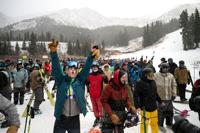‘The landscape has shifted’: Colorado ski resorts adjusting to record visitation, other trends
The sun had yet to rise when Miles Clark recently left his home in Utah to ski the backcountry’s first snow. However early, he had no illusions of first tracks.
“Maybe two or three cars in the parking lot,” went his thinking.
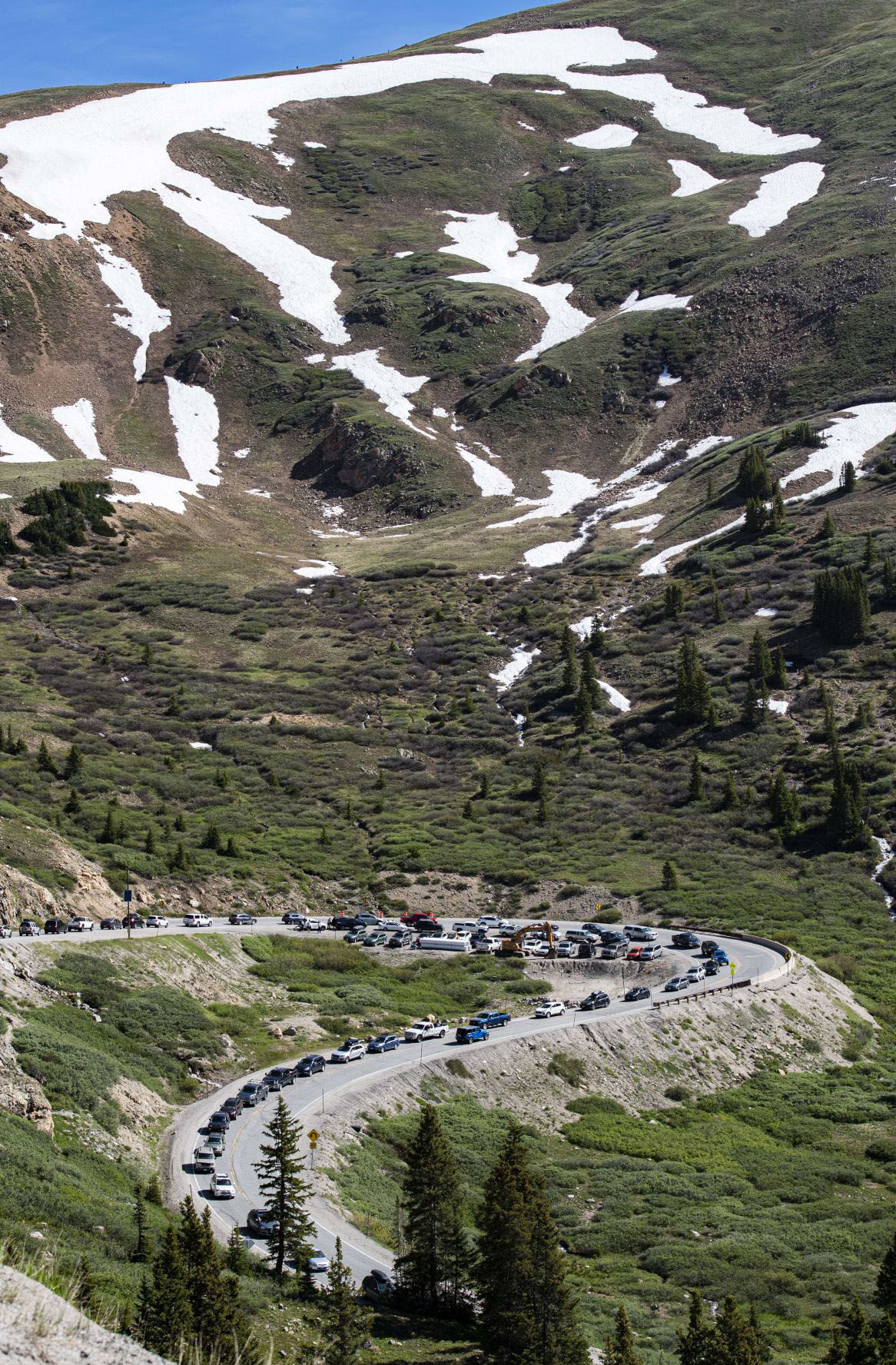
Holiday traffic creeps down Loveland Pass toward Arapahoe Basin Ski Area on the last day of skiing Thursday, July 4, 2019. The ski area’s lots were overflowing, and cars were parked along U.S. Highway 6 from the top of Loveland Pass to a couple of miles below A-Basin. (The Gazette, Christian Murdock)

Holiday traffic creeps down Loveland Pass toward Arapahoe Basin Ski Area on the last day of skiing Thursday, July 4, 2019. The ski area’s lots were overflowing, and cars were parked along U.S. Highway 6 from the top of Loveland Pass to a couple of miles below A-Basin. (The Gazette, Christian Murdock)
“But no,” he said. “I roll into the parking lot at 6:15 a.m., and there’s like 50 cars, and there’s a stream of people up the mountain. I’ve been coming out here four or five years now, and I’ve never seen that.”
Having been plugged into the ski industry for more than 20 years, Clark is seeing things he’s never seen. He’s seeing bigger crowds at destinations he frequents (Park City, Jackson Hole) and others he might visit any given season on his Epic Pass, granting entry to Vail Resorts’ premier mountains in Colorado and beyond. He’s seeing angry reactions up and down threads of the website he manages, SnowBrains, providing news and updates from around the sporting world.
“There’s no question the landscape has shifted,” Clark said.
The question of insiders and outside observers approaching another winter in this strange, angsty era defined by the COVID-19 pandemic: Will social, economic and environmental factors coalesce again to inflate controversy?
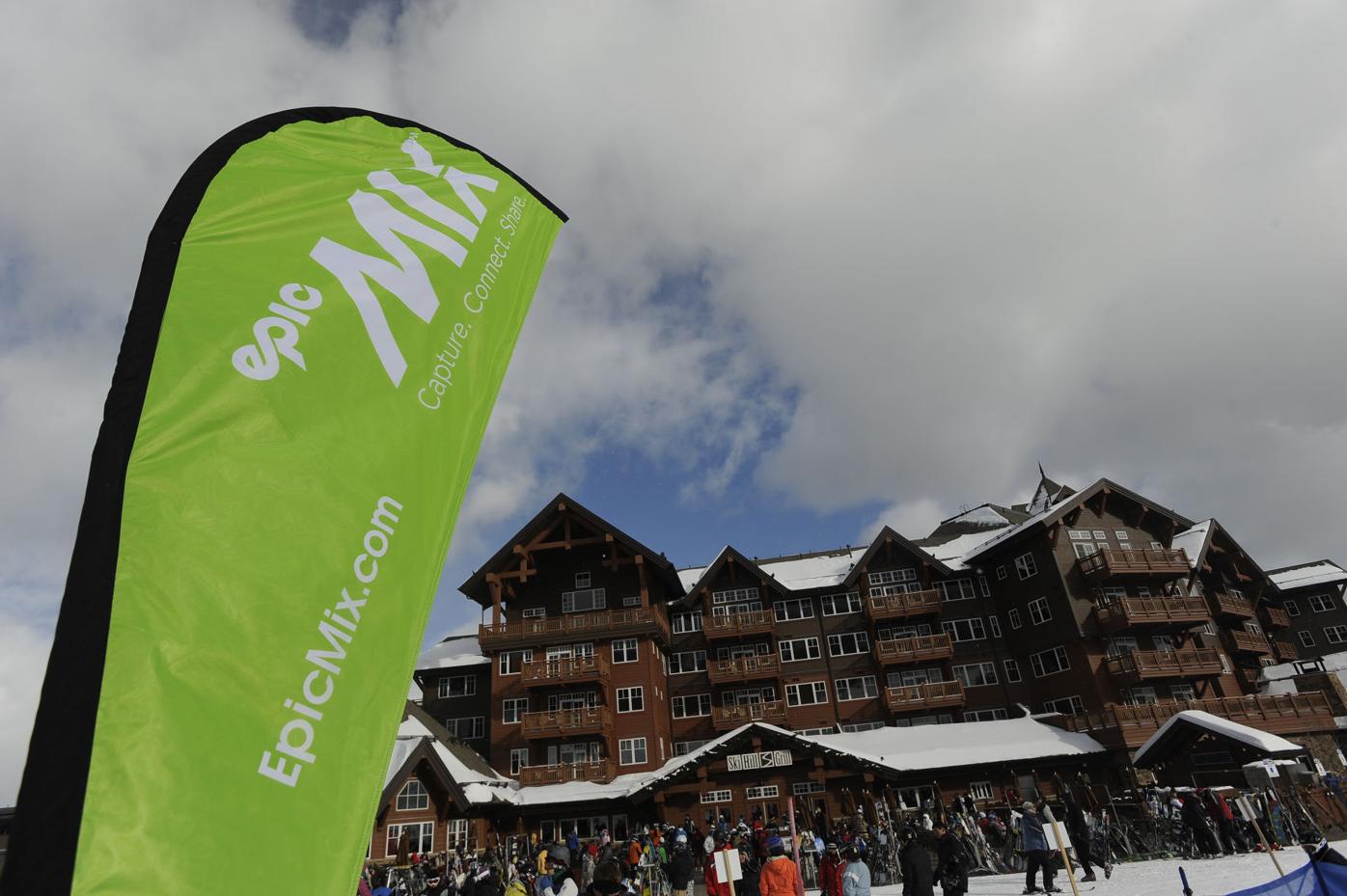
Vail Resorts is encouraging visitors to check their EpicMix app for updates on expected wait times at lift tines. Gazette photo
MARK REIS

Vail Resorts is encouraging visitors to check their EpicMix app for updates on expected wait times at lift tines. Gazette photo
In preparation, Vail Resorts has announced daily limits on lift tickets across its North American portfolio, which in Colorado includes Vail Mountain, Breckenridge, Keystone, Beaver Creek and Crested Butte. The company is telling those buyers to book ahead of time in a move said to prioritize season pass holders.
Meanwhile, more resorts under the Epic Pass-competing Ikon Pass are requiring reservations for that customer base. Aspen Snowmass is joining Jackson Hole, Taos, Big Sky and others around the West to do so this season.
“Gosh, the whole world has shifted,” said another longtime industry watcher, Doug Fish, based in Portland, Ore. “We got BC and AC — before COVID and after COVID. Everything has changed, and the ski business is no different.”
The business last winter struggled with a labor shortage not unique to employers everywhere. Unique, however, was highly public blowback. The New York Times, for one, called it “a winter of discontent,” marked by that labor shortage and by a housing crisis that soared to new, perilous heights during the pandemic, when deep pockets further divided the market across mountain towns.
Without the staff to meet them and run lifts, patrons complained of delayed terrain openings (resort operators also blamed snow patterns). Customers complained, too, of long waits; a social media account called Epic Lift Lines gained popularity. They signed a petition to “hold Vail Resorts accountable.”
“COVID for sure,” is how Fish begins his analysis. He notes loosened work schedules that have moved people to desired places and allowed them to travel and get outside more often. He credits that trend for fueling the pass he started, the Indy Pass, with a growing list of small, lesser-known ski areas.
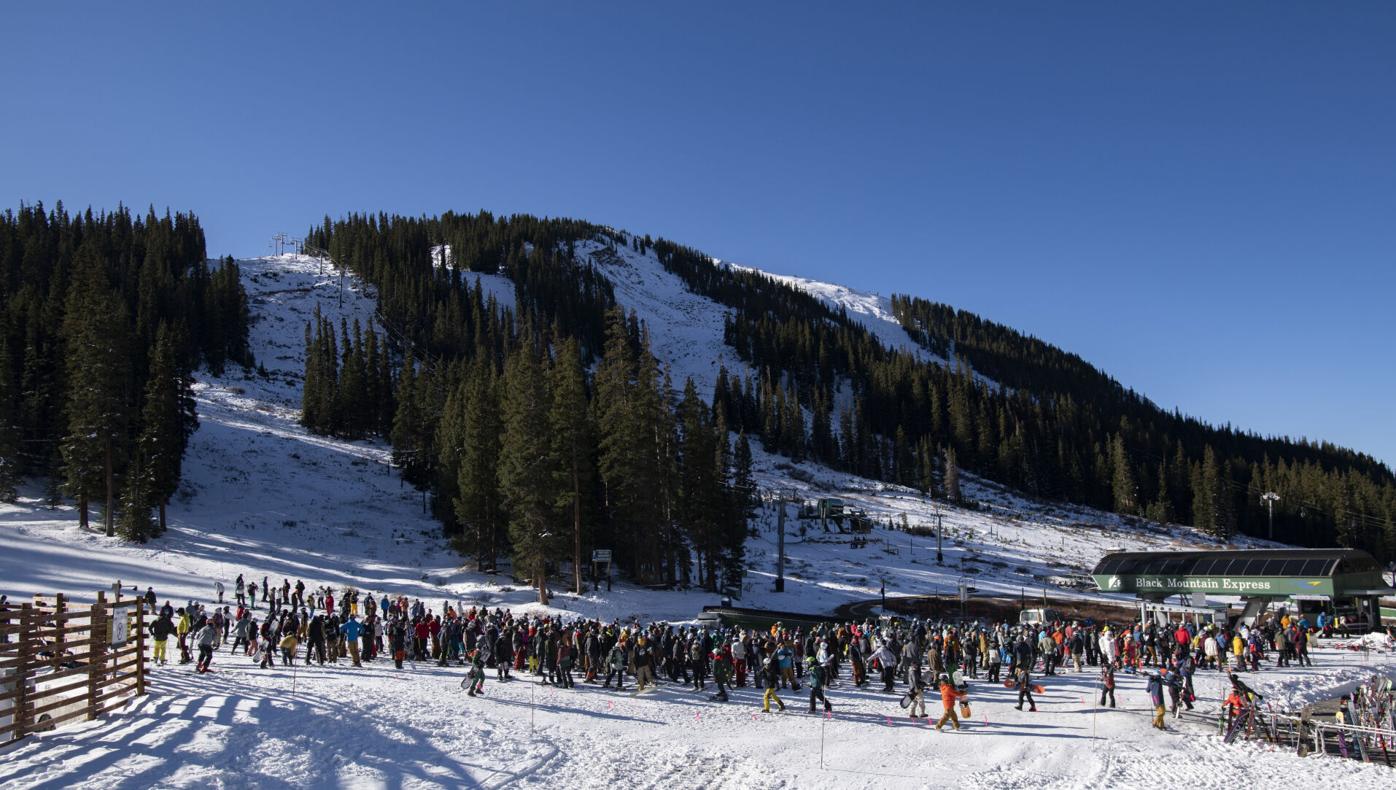
The line builds at the Black Mountain Express at Arapahoe Basin as the sun rises over the mountains Sunday, Oct. 17, 2021, on the opening weekend of skiing in Colorado. Wolf Creek in southwest Colorado opened its 2021-2022 season on Saturday and Arapahoe Basin opened Sunday. (The Gazette, Christian Murdock)
Christian Murdock/The Gazette

The line builds at the Black Mountain Express at Arapahoe Basin as the sun rises over the mountains Sunday, Oct. 17, 2021, on the opening weekend of skiing in Colorado. Wolf Creek in southwest Colorado opened its 2021-2022 season on Saturday and Arapahoe Basin opened Sunday. (The Gazette, Christian Murdock)
With decades in industry marketing, Fish started Indy around the time the Ikon Pass launched to effectively wage war on the Epic Pass. Which is where Fish picks up his analysis:
“Epic and Ikon have done a pretty nice job marketing their products,” he said. “And so yeah, (resorts) are getting crowded.”
He added: “There’s this old concept called supply and demand. … The ski business is finally having to deal with it because demand has increased so much. The popularity of the sport is growing, and it was flat for a long time.”
While a study last year yielded “small gains of new participants in skiing and snowboarding,” by Outdoor Industry Association’s description, the frequency of outings on the snow was found to be up. That’s in line with the latest visitation report from National Ski Areas Association, which credited season pass proliferation for record trips at the country’s 300-plus ski areas. Colorado Ski Country, representing mountains not owned by Vail Resorts, followed up by announcing visitation crossed 14 million, also a record.
For hassles last season, critics pointed to Vail Resorts’ reported year-to-year increase in Epic Pass sales (up 76%). But the company contends the correlation.
“We grew passes pretty substantially last season, and our visitation grew at a much lower rate than our pass sales rate,” said Sara Olson, vice president of communications.
Across resorts, visitation was up 12%, she said, while peak days, including holidays, “were largely flat.” The company belief, Olson said: “When people move from a lift ticket to a pass, they tend to spread out their skiing and riding across the season.”
So for anyone worried day ticket restrictions this winter could lead more consumers to a less-restricted, more cost-efficient pass, that’s the point. “If we can incentivize someone to move to a pass, we think that’s the best option,” Olson said.
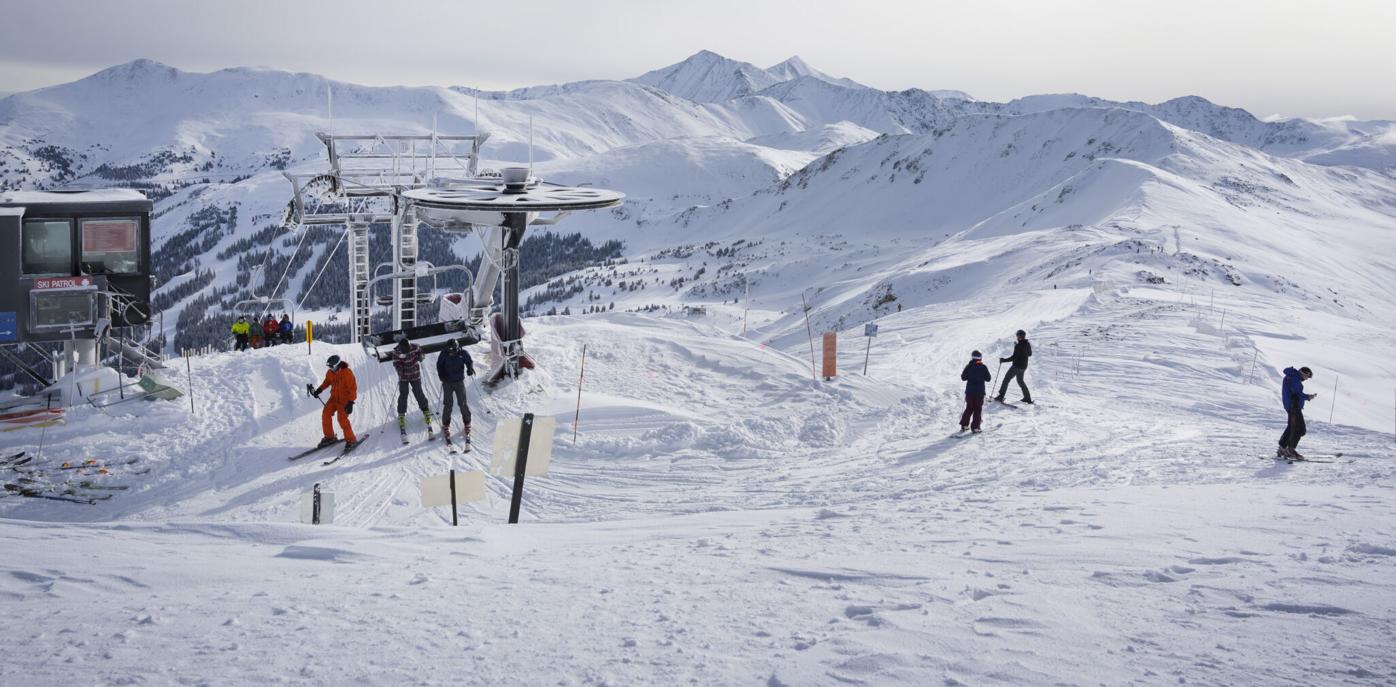
Skiers reach the top of Lift 9 at 12,700 feet on a sunny Saturday, Jan. 12, 2019, at Loveland Ski Area. (The Gazette, Christian Murdock)
CHRISTIAN MURDOCK THE GAZETTE

Skiers reach the top of Lift 9 at 12,700 feet on a sunny Saturday, Jan. 12, 2019, at Loveland Ski Area. (The Gazette, Christian Murdock)
The rise in Epic Pass sales came after a 20% slash to prices. That came as the Ikon Pass was adding participating resorts, like Aspen Snowmass.
“One (reason for joining) was to be on the same playing field that Vail was putting themselves on,” said spokesman Jeff Hanle. “You get someone on that group destination pass, they tend to travel to those destinations. We saw that trend continuing to grow.”
That first year on Ikon, “we saw weekends significantly busier than what we were used to,” he said. “It impacted some of our services and parking availability and all that.”
This season’s reservation system for those passholders, he said, “gives us the ability to see into the future a bit” and prepare for surges. Other Colorado resorts under the Ikon Pass, including Winter Park and Eldora Mountain, have plans to add hundreds of more parking spots this winter.
In a move said to be forward-looking, citing lengthening lines and overflowing parking lots, Arapahoe Basin dropped its name from the Epic Pass in 2019. A year later, the Summit County ski area reported visits down 35%, exceeding its stated, radical-seeming goal. Along with capping Ikon Pass holders to seven days, A-Basin claims to limit its own season passes.
Clark wondered about more operators coming to that decision, admitting his idealistic thinking.
“One of the issues I think that’s difficult in the ski industry and in America is this idea that you have to have year-over-year growth, otherwise it’s not sustainable,” he said. “I’d like to think we could have a more sustainable model. Like, this is the money we make, and if we can maintain things, that’s OK. Maybe that could mean limiting how many Epic and Ikon passes they sell.”
Or maybe reservations are the way of the future, Clark said. “I do think the industry is turning to a place where you need to be ready to have a bit of a schedule. Akin to buying an airplane ticket.”
But he recognized the spirit of the sport lies in spontaneity — in those rare, cherished windows of powder. And he recognized the heart of the debate: inclusion that is already lacking around the slopes. How to provide the right experience while also improving access?

Mason Davis cheers with the crowd when it’s announced that marketing team members will hand out rolls of duct tape to the first people waiting in line for the Black Mountain Express Lift to open during opening day at Arapahoe Basin Ski Area on Oct. 23, 2022.
Timothy Hurst, Gazette file

Mason Davis cheers with the crowd when it’s announced that marketing team members will hand out rolls of duct tape to the first people waiting in line for the Black Mountain Express Lift to open during opening day at Arapahoe Basin Ski Area on Oct. 23, 2022.
“What we don’t want to do is make the solution creating a more exclusive sport,” Olson said.
Vail Resorts is intent on addressing what it sees as more pressing, underlying issues.
The company has raised minimum wage to $20 for all employees, in addition to boosting mental health benefits and leadership development. Vail Mountain is center stage of a legal fight for workforce housing. It’s also grounds for the $320 million the company has pledged to invest across resorts; Vail is set for two new high-speed lifts this season, Breckenridge for one.
Time will determine success, Olson said.
“I think everyone is super hopeful this is going to feel like a more normal ski season,” she said.





